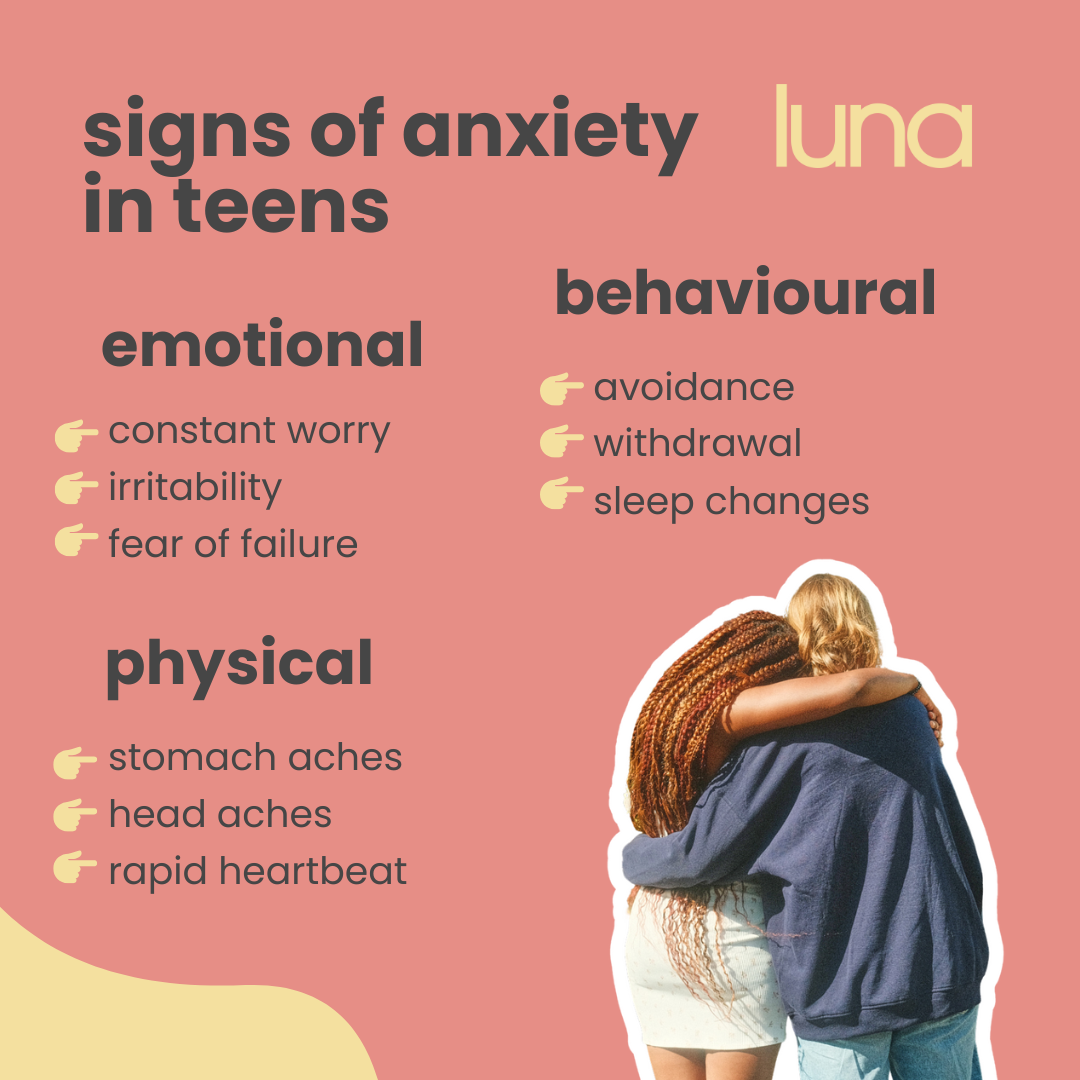Teenage anxiety: spotting the signs
Anxiety symptoms in teens

Updated December 2, 2025 • Medically reviewed by Dr. Katie Knight
Medically reviewed by Dr. Katie KnightIn this article
- Quick summary
- Anxiety symptoms in teens: what parents should notice
- Anxiety in teenage girls: why it’s more common
- How to help teens with anxiety at home
- Teenage anxiety treatments and professional help
- When parents should seek medical advice
- How parents can build resilience in anxious teens
- Support is out there
Quick summary
- Teenage anxiety is common but often mistaken for moodiness or attitude
- Signs include emotional changes, physical symptoms, and behavioural shifts
- Early recognition, open communication, and professional support can make a big difference

If your teen seems more withdrawn, irritable, or constantly worried, anxiety may be part of the picture.
It’s more common than many parents realise, but too often it gets mistaken for teen attitude, school or exam stress, or moodiness.
The good news? Once you know what to look for, you can step in early, helping your teen manage anxiety before it becomes overwhelming.
Let’s look at the signs of anxiety in teens, practical ways to help, and when to seek professional support.
Anxiety symptoms in teens: what parents should notice
Anxiety shows up in different ways, and teens aren’t always able to name what they’re feeling.
As a parent, it helps to watch for a mix of emotional, physical, and behavioural signs:
- Emotional signs: constant worry, irritability, fear of failure
- Physical signs: stomach aches, headaches, rapid heartbeat, restlessness
- Behavioural signs: avoiding school or activities, changes in sleep or eating, withdrawing from friends
Sometimes anxiety can come across as anger, defiance, or silence rather than worry.
That’s why paying attention to patterns - not just words - is key.

Anxiety in teenage girls: why it’s more common
Girls are statistically more likely to experience anxiety during adolescence.
This is partly because of hormonal changes, but also due to social pressures around body image, friendships, and performance.
For parents, emotional signs might look different: perfectionism, over-apologising, or crying easily.
These signs are worth noticing and addressing gently – with validation, not dismissal.
How to help teens with anxiety at home
It can be really hard to see your teen struggling, and it’s natural to feel helpless at times.
But there are things you can do to make their lives a little easier.
You could try to
- Create an open, judgement‑free space: let your teen know they can talk without fear of criticism
- Help identify triggers: journaling or talking together can help pinpoint what sparks anxiety
- Teach coping skills: deep breathing, mindfulness, time outdoors – find what works for them
- Model calm behaviour: teens often mirror how parents react in stressful moments
- Reassure without minimising: saying “I understand this is hard” can mean more than quick fixes
Patience, listening, and empathy are your best tools.
If you feel they aren't super receptive to your offers of support, and the anxiety is present but not serious, you could introduce them to luna which has lots of management techniques available.

Teenage anxiety treatments and professional help
If anxiety is persistent, professional support can be a game‑changer.
Options include:
- Therapies: cognitive behavioural therapy (CBT), talking therapy and family counselling
- Mindfulness and relaxation programmes: sometimes available through schools
- Support groups: teens often benefit from hearing they aren’t alone
- Apps: there are some great apps for teens that provide wellbeing support and anxiety management, including luna
- Medication: for severe anxiety, under a doctor’s guidance
Early intervention generally leads to better outcomes, so trust your instincts if you feel something isn’t right.
Never hesitate in seeking professional support when it comes to mental health.

When parents should seek medical advice
Reach out to a professional, like your GP, if your teen experiences:
- Persistent worry that affects school or friendships
- Physical symptoms without a clear cause
- Talk of hopelessness or self-harm (this is urgent)
Your observation as a parent matters – early support can prevent anxiety from becoming more serious.
If your teen is experiencing a mental health crisis, in the UK you can call NHS 111 and select option 2 for urgent mental health support. This is available all day, every day.
Your teen can also access free 24/7 confidential mental health support via text message – they can text SHOUT to 85258.
How parents can build resilience in anxious teens
With your support, your teen can develop strength and coping skills that last a lifetime.
But remember, resilience doesn’t just happen overnight.
Here are some ways to help them build resilience:
- Encouraging balanced routines – consistent sleep, meals, and physical activity
- Supporting friendships and hobbies
- Teaching small-step goal setting to build confidence
- Celebrating effort, not perfection
These habits give teens a toolkit they can carry into adulthood.
Support is out there
Anxiety is really common in teens, but this doesn't mean it simply needs to be endured.
By having open conversations about mental health and providing your teen with coping skills, you and your teen can tackle anxiety head-on.
However, you don’t have to support your teen alone. Facing anxiety is scary for your teen, but it is also scary for you.
Always reach out to a professional if anxiety is overwhelming your teen.

How we created this article:
luna's team of experts comprises GPs, Dermatologists, Safeguarding Leads and Junior Doctors as well as Medical Students with specialised interests in paediatric care, mental health and gynaecology. All articles are created by experts, and reviewed by a member of luna's senior review team.
Sources:
Young Minds "Anxiety" | Accessed 30.10.25
https://www.youngminds.org.uk/young-person/mental-health-conditions/anxiety/ADAA "Facts" | Accessed 30.10.25
https://adaa.org/living-with-anxiety/women/factsNHS "Anxiety in children" | Accessed 30.10.25
https://www.nhs.uk/mental-health/children-and-young-adults/advice-for-parents/anxiety-in-children/NHS "Anxiety disorders in children" | Accessed 30.10.25
https://www.nhs.uk/mental-health/children-and-young-adults/advice-for-parents/anxiety-disorders-in-children/NHS Derbyshire Family Health Service "Teenage anxiety" 10.30.25
https://derbyshireteenhealth.nhs.uk/youremotions/anxietyNHS "Anxiety, fear, panic" | Accessed 30.10.25
https://www.nhs.uk/mental-health/feelings-symptoms-behaviours/feelings-and-symptoms/anxiety-fear-panic/We'd love to keep in touch!
Sign up to our parent newsletter for emails on the latest teen trends, insights into our luna community and to keep up to date
By signing up, you are agreeing that we can use your email address to market to you. You can unsubscribe from marketing emails at any time by using the link in our emails. For more information, please review our privacy statement.